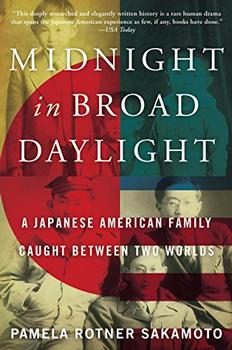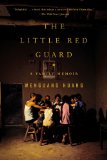Summary | Excerpt | Reviews | Beyond the book | Read-Alikes | Genres & Themes | Author Bio

A Life in Three Wars
by Andrew X. PhamThe Eaves of Heaven is difficult to categorize. It's
not quite a biography, autobiography, nor memoir. "I did not
set out to write my father's biography…" the author states
in his notes at the front of the book. "I have lent his life
stories my words. The perspectives and sentiments within are
his." Although it doesn't fit the standard mould, however,
the book's format "works;" it's both effective and
affecting. The end result is an absorbing, real-life account
of Thong Van Pham's life in Vietnam during a particularly
turbulent era.
Thong Van Pham's story is told in two parallel time lines,
one relating his childhood in North Vietnam (1940 – 1954),
the other his adulthood in the South (1956 – 1976). The
author's approach can cause the reader a certain amount of
confusion at first, as the narrative bounces back and forth
between decades, making it difficult to follow.
Additionally, the reader expects a book in biographical
format, and at first he or she may interpret the "I" of the
story as being Andrew X. Pham and the "father" as Thong. The
author's notes make it clear in hindsight that Thong is the
narrator, not the author, but this may not sink in for the
reader for the first thirty pages or so. Indeed, at first
the reader is much more aware of the book's structure than
its content; but once the reader is oriented he or she stops
focusing on the style, gradually becoming absorbed in
Thong's experiences.
Andrew Pham remarks in the Acknowledgements that the book's
genesis was a short story about the childhood games his
father played in North Vietnam. It is not surprising, then,
that the early chapters of the book are recollections of
Thong Van Pham's parents, early playmates and experiences,
and are full of joy and abundance. These short, entertaining
vignettes have a less serious feel than later parts of the
book. The corresponding chapters from the South are also
happier and lighter, relating Thong's early career and his
marriage.
The tenor of the book becomes progressively darker. Thong's
life in the North is colored by an increasing awareness of
the political climate. His family is caught in the middle
between the Viet Minh and French factions, both of which
demand complete loyalty while at the same time abusing the
populace in general. The parallel time line in the South
relates Thong's difficult years as a draftee in the South
Vietnamese army.
As the book proceeds, more of the narrative is dedicated to
Thong's adult life. He is heavily involved in the conflict
(now between the North and South Vietnamese and their
various international backers), and is trapped in Saigon
during its fall. This part of the book is truly hair-raising
and intense.
The Eaves of Heaven does presuppose knowledge of the
events, players and politics that those born after the
Vietnam War years may not possess. It may be helpful for the
reader to peruse a summary of the conflict before beginning
the book (see sidebar).
Andrew Pham's writing throughout The Eaves of Heaven
is crisp and straight-forward. His descriptions are
detailed, yet minimal, providing an excellent sense of time
and place without embellishment. The story never bogs down
or becomes dull. Readers may, in fact, find themselves
wishing for more after turning the final page. This book's
fast pace and involving story is likely to appeal to a wide
range of readers well beyond the genre boundaries of history
and biography aficionados.
About The Author
 Andrew X Pham (pronounced fam) was born in Saigon,
Vietnam in 1967. His father, Thong Van Pham, worked for the
US during the Vietnam War and was imprisoned in a
reeducation camp after the war by the Communists. The family
arrived in California in 1977 as 'boat people'.
Andrew X Pham (pronounced fam) was born in Saigon,
Vietnam in 1967. His father, Thong Van Pham, worked for the
US during the Vietnam War and was imprisoned in a
reeducation camp after the war by the Communists. The family
arrived in California in 1977 as 'boat people'.
As a child, Andrew thought he would become a painter but
eventually followed his father (a software engineer) into
the same field, graduating from UCLA with a degree in
aerospace engineering in 1990. After briefly working
as an aircraft engineer, he realized he was unfit for
cubicle work so quit his job to pursue an M.B.A. and an M.S.
in Engineering. Eventually, he abandoned his studies,
and, saddled with debts, tried his hand at writing for a
living - working as a technical writer and editor and as a
restaurant critic for a local newspaper (which he notes was
a wonderful job for a starving artist!)
During this time he also bicycled through all the western
United States, part of Japan and finally, most of Vietnam.
The latter journey he recorded in
Catfish and Mandala: A Two-Wheeled Voyage Through the
Landscape and Memory of Vietnam, which won the 1999
Kiriyama Pacific Rim Book Prize.
Pham's other honors include the Whiting Writer Award, QPB
Nonfiction Prize, Quality Paperback Book Prize, Guardian
Shortlist Finalist, New York Times Notable Book of the Year,
a Barnes & Noble Discovery Book, a Border's Original Voices
Selection and the Oregon Literature Prize. In 2009 he
was awarded a John Simon Guggenheim Memorial Foundation 2009
Fellowship for nonfiction.
Speaking of his life to date on his
website,
Pham writes:
"It has been a long arduous road, filled with dark abysses,
marvelous heights, gut-rotting doubts, exquisite joys,
heartbreaks, memorable feasts, and long stretches of hunger.
The view ahead seems to promise more of the same. But I have
enjoyed the journey immensely. There is some truth in the
old proverb: The rewarding path is never easy, the easy path
never rewarding.
Along the way, I've held a dozen different jobs and lived in
eight cities scattered across four states. I have been
traveling and living abroad since 2002. In a way, I have
become a painter of sort. Medium: words on paper. Subject:
life as I see it.
![]() This review was originally published in The BookBrowse Review in July 2008, and has been updated for the
July 2009 edition.
Click here to go to this issue.
This review was originally published in The BookBrowse Review in July 2008, and has been updated for the
July 2009 edition.
Click here to go to this issue.

If you liked The Eaves of Heaven, try these:

by Pamela Rotner Sakamoto
Published 2017
Alternating between American and Japanese perspectives, Midnight in Broad Daylight provides a fresh look at the dropping of the first atomic bomb.

by Wenguang Huang
Published 2013
Three generations of a family living under one roof reflect the dramatic transformations of an entire society in this memoir of life in 20th century China.
Your guide toexceptional books
BookBrowse seeks out and recommends the best in contemporary fiction and nonfiction—books that not only engage and entertain but also deepen our understanding of ourselves and the world around us.